

Full text of "International organisation and dissemination of knowledge : selected essays of Paul Otlet" Archives centre. The origins of the Mundaneum go back to the late nineteenth century.
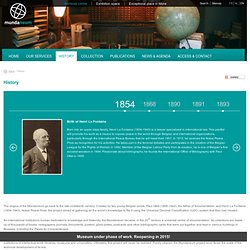
Created by two young Belgian jurists, Paul Otlet (1868-1944), the father of documentation, and Henri La Fontaine (1854-1943), Nobel Peace Prize, the project aimed at gathering all the world’s knowledge to file it using the Universal Decimal Classification (UDC) system that they had created. Otlet. Otlet, Paul (1868-1944) Belgian lawyer, the founding father of documentation.
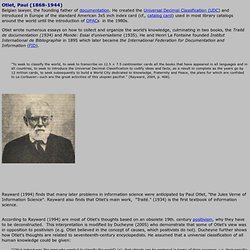
He created the Universal Decimal Classification (UDC) and introduced in Europe of the standard American 3x5 inch index card (cf., catalog card) used in most library catalogs around the world until the introduction of OPACs in the 1980s. Otlet wrote numerous essays on how to collect and organize the world’s knowledge, culminating in two books, the Traité de documentation (1934) and Monde: Essai d'universalisme (1935). He and Henri La Fontaine founded Institut International de Bibliographie in 1895 which later became the International Federation for Documentation and Information (FID). Rayward (1994) finds that many later problems in information science were anticipated by Paul Otlet, "the Jules Verne of Information Science".
According to Rayward (1994) are most of Otlet's thoughts based on an obsolete 19th. century positivism, why they have to be deconstructed. Literature: Baugniet; J. (1970). Buckland, M. UDC Consortium - UDC History. In 1885, Paul Otlet, a young Belgian barrister already noted for his work in documentation and his collaborator Henry La Fontaine were working on the projected Universal Bibliographic Repertory, which was intended to become a comprehensive classified index to all published information.
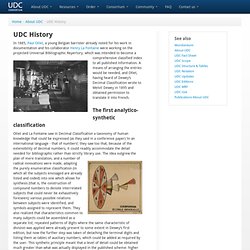
A means of arranging the entries would be needed, and Otlet, having heard of Dewey’s Decimal Classification wrote to Melvil Dewey in 1895 and obtained permission to translate it into French. The first analytico-synthetic classification Otlet and La Fontaine saw in Decimal Classification a taxonomy of human knowledge that could be expressed (as they said in a conference paper) ‘in an international language - that of numbers’; they saw too that, because of the extensibility of decimal numbers, it could readily accommodate the detail needed for bibliographic rather than strictly library use.
It contained about 33,000 subdivisions. UDC Summary. UDC Consortium: Bibliography. UDC Is Correct. Two highly ambitious (and possibly clientless?)
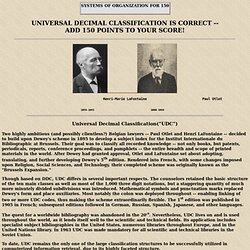
Belgian lawyers -- Paul Otlet and Henri LaFontaine -- decided to build upon Dewey's scheme in 1895 to develop a subject index for the Institut Internationale du Bibliographic at Brussels. Their goal was to classify all recorded knowledge -- not only books, but patents, periodicals, reports, conference proceedings, and pamphlets -- the entire breadth and scope of printed materials in the world. After Dewey had granted approval, Otlet and LaFontaine set about adopting, translating, and further developing Dewey's 5th edition. Rendered into French, with some changes imposed upon Religion, Social Sciences, and Technology, their completed scheme was originally known as the "Brussels Expansion. " Though based on DDC, UDC differs in several important respects. The quest for a worldwide bibliography was abandoned in the 20's. The Mundaneum Museum Honors the First Concept of the World Wide Web.
Paul Otlet, visioning a web in 1934. Otlet Page. The Universe of Information: the Work of Paul Otlet for Documentation and international Organization.
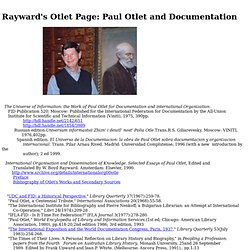
FID Publication 520; Moscow: Published for the International Federation for Documentation by the All-Union Institute for Scientific and Technical Information (Viniti), 1975, 390pp. Russian edition:Universum informastsii Zhizn’ i deiatl’ nost’ Polia Otle.Trans.R.S. Giliarevesky. Moscow: VINITI, 1976,402pp. Spanish edition. International Organisation and Dissemination of Knowledge. Preface Bibliography of Otlet's Works and Secondary Sources "UDC and FID: a Historical Perspective," Library Quarterly 37(1967):259-78. Alle Kennis van de Wereld (Biography of Paul Otlet) <div style="padding:5px; font-size:80%; width:300px; background-color:white; margin-left:auto; margin-right:auto; border:1px dashed gray;"> Internet Archive's<!
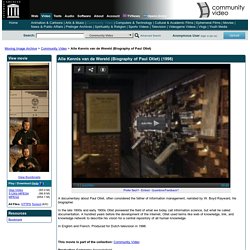
--'--> in-browser video player requires JavaScript to be enabled. It appears your browser does not have it turned on. Please see your browser settings for this feature. </div> Click to have player try flash first, then HTML5 second A documentary about Paul Otlet, often considered the father of information management, narrated by W. In the late 1800s and early 1900s Otlet pioneered the field of what we today call information science, but what he called documentation. In English and French. This movie is part of the collection: Community Video. Analogous Space - THE PAUL OTLET CASE STUDY. The conference considers Paul Otlet (Brussels 1868-Brussels 1944), Belgian intellectual, utopian internationalist and visionary theorist about knowledge organization, as a stepping stone.
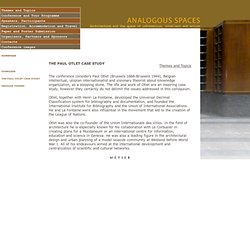
The life and work of Otlet are an inspiring case study, however they certainly do not delimit the issues addressed in this colloquium. Otlet, Paul 1868-1944. Michael Buckland's Paul Otlet Page.